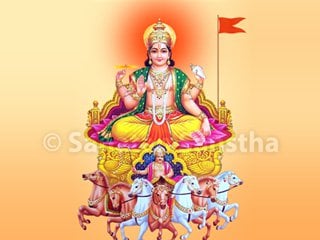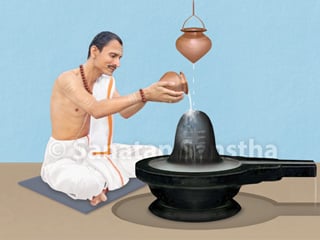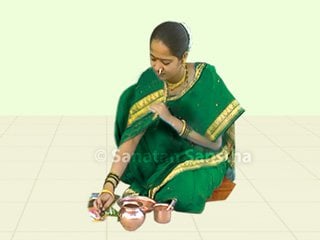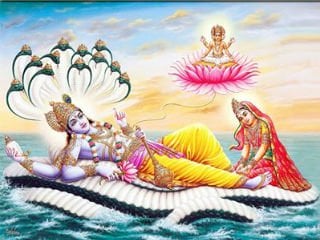Significance of religious traditions
A. Religious traditions are in fact the workshops that teach us actual Dhārmik (Righteous) conduct.
B. Religious traditions are opportunities Hindu Dharma has given to the people to learn Dhārmik conduct, that is, how to actually perform duty.
C. The impressions of Dhārmik conduct created through the medium of Holy festivals, Religious festivals and Vowed religious observances can take the Nation towards Divine Kingdom.
D. Through the process of religious traditions, the Ichhā-shakti (Energy of will) of the Creator of nature, that is, Brahma is activated, which provides necessary strength for the individual to perform the specific Karma (Action which gives rise to destiny). Hence, when the individual meticulously follows the traditions in Hindu Dharma after understanding their importance, he becomes an authority in the path of Karma in due course. This also teaches the individual how to follow Bhaktiyog (Path of Devotion) even while performing Karmakānḍa (Spiritual practice of rites, rituals and observances performed at the physical level) and has thus made available a short cut to Karma through performing acts.
1. Purpose of celebrating Holy festivals,
Religious festivals and Vowed religious observances (vrats)
A. General Information
Our Holy festivals and Religious festivals are such that they not only give us happiness while alive, but also help our subtle body gain momentum after death.
B. Realisation of the changes in the nature
For example, Nāriyal Pourṇimā is celebrated at the cessation of monsoons, when the sea becomes calm.
C. Increase in devotion through birthday celebrations of Incarnations
For example Shrīrām Navamī. The birthdays of Incarnations like Shrīrām, Shrīkrushṇā etc. according to the panchāng (Hindu almanac), are celebrated because in their case, the renunciation of body is not death. They can assume a body for the sake of their devotees anytime, meaning they are immortal.
D. Spiritual benefits through celebration of the death anniversary (according to the panchāng) of Saints
For example the death anniversary of Saint Dnyānēshwar. The death anniversary of Saints is celebrated, because most of the time they appear to be average persons or seekers by birth. Later, with spiritual practice they attain Sainthood. After renunciation of the body they go to higher loks (Regions) and that further augments their mission; energy expended thus far for the physical body is utilised for the mission. Hence, their death anniversaries are celebrated as a Holy remembrance. In case of ordinary mortals, the death anniversary is remembered because of the necessity of performing the ritual of shrāddha (Rites for departed ancestors) on that day.
E. Getting motivated to do spiritual practice through Puranic and historic events
An example is Vatapourṇimā. On this day Savitri won a debate with Deity Yamarāj (Deity of Death) and thereby successfully forced Him to bring her husband back to life.
F. Spiritual education
The sole objective of any form of spiritual practice is to bring about a non-duality amongst the seeker, his spiritual practice and his spiritual goal, meaning merging of the seeker with God. From this point of view, to inculcate a habit of seeing God even in the modes of spiritual practice, some Holy festivals are celebrated. For example:
Sheetla Saptamī
Appliances such as the gas stove, frying pan, pincers etc. are not used on this day. Instead, they are worshipped on this day.
Polā
On this day, farmers worship the oxen and ploughs.
Vijayādashamī
On this day each one worships his own tools. For instance, a tailor his scissors and tailoring instruments, a student and teacher their books etc.
Lakshmī-pūjā
On this day businessmen worship the weighing scale and account books, while housewives worship the broom.
2. Difference between Holy festivals,
Religious festivals and Vowed religious observances
This demarcation is not well defined as some Holy festivals are also celebrated as Religious festivals and Vowed religious observances. For example Shrīrām Navamī when celebrated individually is a Holy festival, when celebrated socially is a Religious festival and when celebrated individually with a specific sankalp (resolve), it becomes a vrat (Vowed religious observance).
3. Do not view Holy and Religious festivals merely as
traditions, understand the underlying science and deeper meaning !
Bharat has a number of Holy and Religious festivals and traditions. However, most people view and celebrate them merely as age-old practices; they do not pay attention to the underlying science and their deeper meaning. On Gudhī pādwā (beginning of the Hindu New Year), leaves of Neem are partaken as Prasād (Holy sacrament). Neem leaves have the ability to attract Prajāpati frequencies (frequencies of Deity Brahma), which are maximum on that day. The science underlying partaking of Neem leaves on that day is, ‘As Neem leaves have the ability to absorb the Prajapāti frequencies that are present in larger proportion in the atmosphere frequencies.’ If the underlying science of the Holy and Religious festivals is known, they can be celebrated with added faith. Sometimes there is a difference in the ways of celebration of Holy and Religious festivals because of regional variations, social customs and ways of worship. The point to be noted here is that even when there is no scientific basis, celebrating festivals merely as an age-old tradition is incorrect. Such baseless traditions should be discontinued and only those practices as advocated by the scriptures should be continued. With respect to Vowed religious observances, they have the sankalp of an evolved person, which by itself is the underlying scientific reason.
4. Importance of Holy festivals, Religious festivals and
Vowed religious observances from the point of God-realisation
A. As Holy festivals, Religious festivals and Vowed religious observances have a spiritually scientific base, celebrating them results in generation of Chaitanya (Divine consciousness) and that helps even an ordinary man to move towards God.
B. From a seeker’s viewpoint, Karmakānḍa may be an inferior form of spiritual practice, yet it is important to gradually divert those not doing any spiritual practice, towards Spirituality. From Karmakānḍa point of view, the Holy festivals, Religious festivals and Vowed religious observances are so important that at least one or the other happens to be on 75% of the tithīs (A lunar day) in a year.
C. We should always exercise restraint in our life; but in practice it is difficult. Hence, at least during Holy festivals, Religious festivals and Vowed religious observances it should be exercised, so that gradually we become accustomed to a life of restraint.

 Ratha Saptami 2025
Ratha Saptami 2025 Mahashivratri 2025
Mahashivratri 2025 Importance of Adhik maas (Purushottam maas)
Importance of Adhik maas (Purushottam maas) Vaikunth chaturdashi is an invaluable opportunity granted to us to worship Deity Shri Vishnu
Vaikunth chaturdashi is an invaluable opportunity granted to us to worship Deity Shri Vishnu How to celebrate Navaratri in adverse times caused by coronavirus pandemic ?
How to celebrate Navaratri in adverse times caused by coronavirus pandemic ?